Organized by Vilnius University in Lithuania
Summer School 2022
Background
In Lithuania, as in many countries, interest in science and science education is not strong, and it is worrying that girls in particular are not very interested in science and science education (as shown by the low number of girls choosing non-formal education activities in science and coding, and the higher proportion of boys than girls choosing science and science study programmes). Thus, the inclusion of girls in STEAM is a pressing issue in Lithuanian education. It is also a matter of public concern, as programming activities will become commonplace in the future. It is therefore very important that girls participate fully in programming activities. That is why programming was one of the main themes of the Smart City 2022 Summer School. The way to get people interested in coding was by providing knowledge, demonstrating the importance of coding and carrying out creative coding activities.
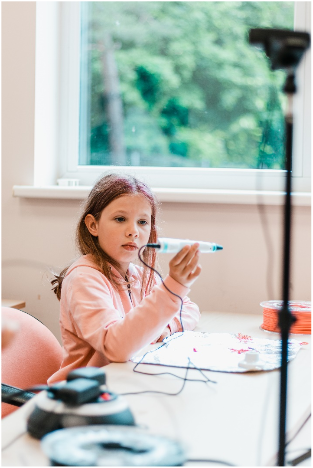
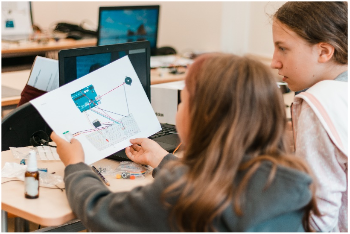
The Programme
The summer school was attended by 36 girls aged between 12 and 14 years. The summer school took place in the premises of Vilnius University Business School (Saulėtekio al. 22).
On the first day of the summer school, the girls were taught how to use 3D pencils and hot glue, and Dr. Anita Juškevičienė, discussing the topic “How to live more comfortably”, presented what is meant by a Smart House, what are the generations of Smart Houses (wireless technologies (I), artificial intelligence (II), robots (III), Smart House components, identifying objects, Smart House control systems. Next, an introduction to Arduino programming was given (in order to start working with Arduino, drivers and a C programming environment (IDE) must be installed on the computer). The girls learnt about “technical brains” (Micro)Controllers, connecting devices, data acquisition. A lot of information was given about sensors and data processing.
The participants of the summer school learnt about data acquisition, data processing, data output.
A girl was given tasks:
- “What would you like to build?”. Questions for the selection of ideas for mini-projects: What problem will you solve? What is the context?
- Idea modelling (drawings, sketches)
The next step was to explain about electronic devices. Electrical circuits, electrical signals (analogue signal, digital signal), controller outputs and commands. Digital signals. Example: Simple application Traffic light. LED on/off buttons. Coloured light. Photoresistor – light controlled resistance. Potentiometer (variable resistor). Prototyping (a way to find out how different electronic devices and their circuits work, to identify and understand the patterns of operation and interaction of the elements that make them up – to assemble them on a mock-up board.
Information was given on the controller board and the layout board, semiconductors, passive circuit elements, resistors. The girls carried out a prototyping task.
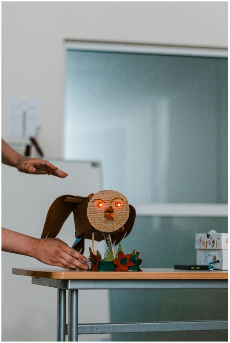
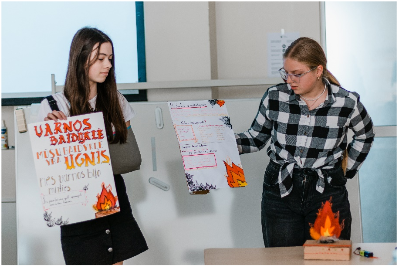
Feedback
Parents: ‘thank you for the intense, engaging summer school activities’, ‘the school was great, lots of new and untried activities for Ugne, it’s a pity the school was so short’
Organisers: “It’s good to do meaningful activities”, “oh how good that the summer school is over, oh what a pity that the summer school is over”, “how wonderful to see so many curious eyes”
Participants: ‘I liked programming, I want to do it more often, I want to go deeper into programming’; ‘it was good to meet people, make friends, develop ideas together and make them happen.
Summer School 2021
We organized the summer school “Smart city 2021” for girls aged 12-14 on August 16-19. We planned the school program focusing on the goals of the project – to reveal the girls’ abilities, to motivate girls to learn STEM subjects, to be interested in programming activities, to promote their digital and entrepreneurial skills. The four-day school program was intensive due to the variety of practical activities and forms of leisure.
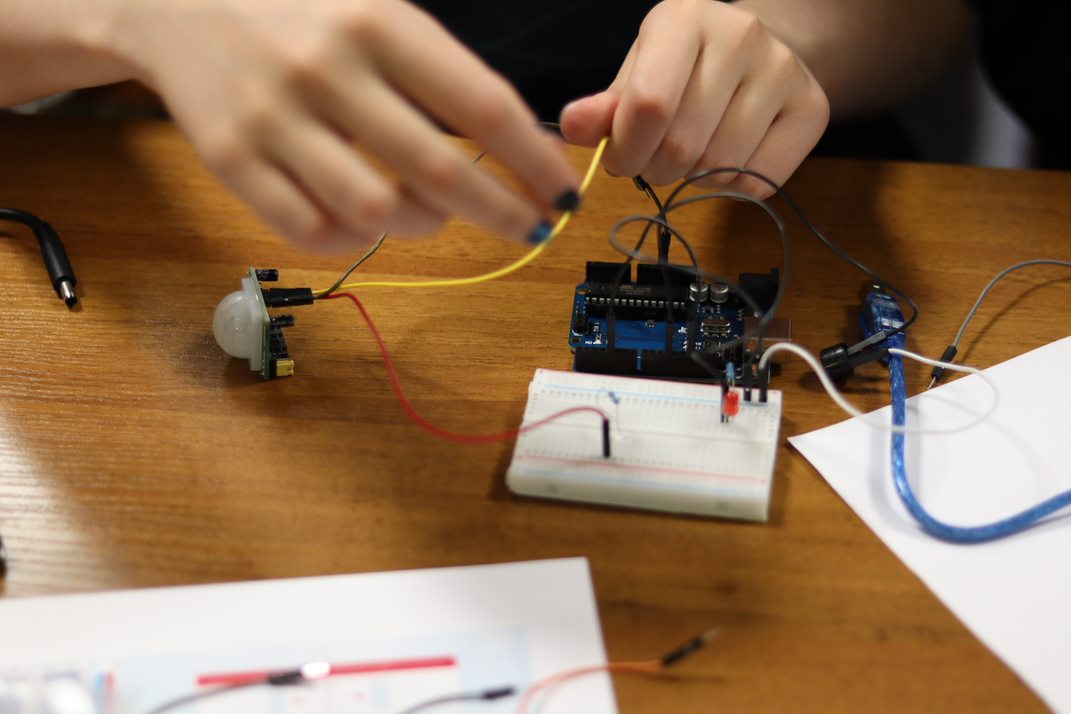
On the first day of the school, after welcoming and getting acquainted with the participants, we went to the demonstration center of the smart home (UAB JUNG). It is a unique object in Lithuania, where under one roof there is a high concentration of integrated smart systems controlled from one common system. Smart systems integrated into all areas of the building: automated field watering, smart ventilation and heating, fingerprint scanning and face recognition system, microchip unlocking the door under the skin. It was interesting to see an outdoor air monitoring station installed on the roof of the building, which automatically sends signals to regulate the indoor temperature or to close the blinds if the sun is shining outside. During the visit, the girls were not only able to get acquainted with examples of smart technologies, but also had the task of finding ideas for their projects. We are very grateful to JUNG for the comfortable bus that took us to the center of the smart home and brought as back to school.
We continued the activities of the first day by sharing our impressions about the smart home and the discussion “How to live more comfortably?” and the presentation of Arduino prototypes.
On the second day, we discussed ideas for home improvement. The girls were actively proposing mini-project ideas, some of the ideas seemed extremely futuristic, so deciding on a mini-project was hard enough, but really interesting.
One of the goals of this school is to get acquainted with the portrait of a successful businesswoman. The guests of the school are Daiva Viskontienė, General Director of BMK, and Monika Katkutė, General Director of Teachers Lead Tech. These were certainly inspiring examples.
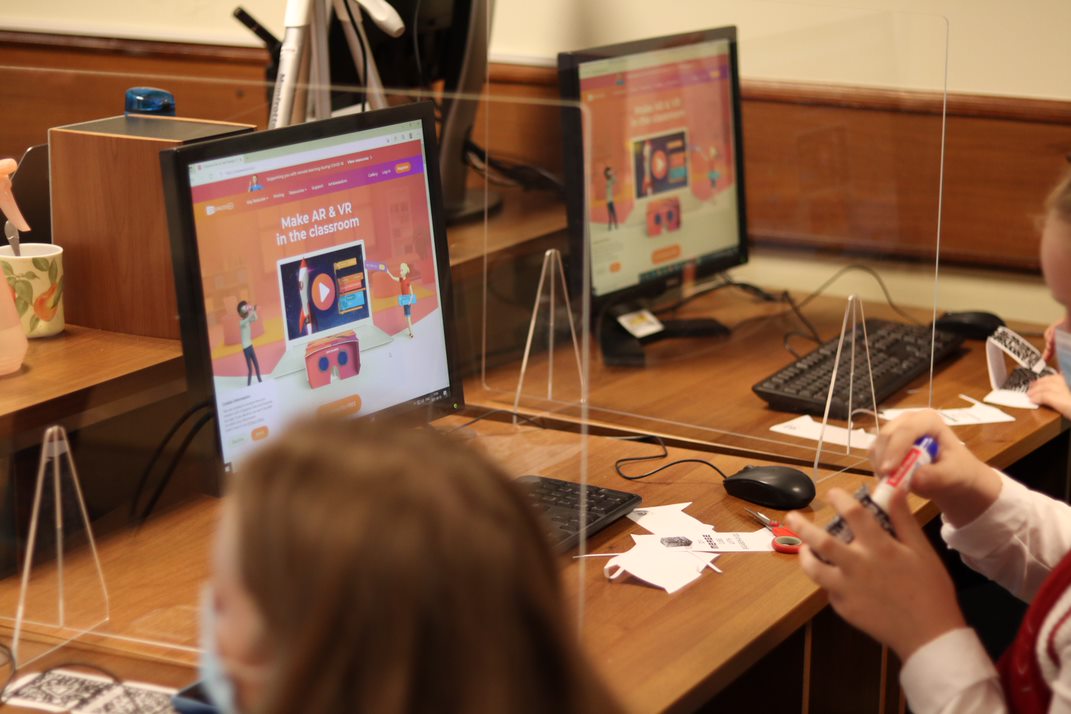
The excursion to the architectural ensemble of Vilnius University as well as the visit to the demonstration center of the smart house was purposefully chosen. The girls’ creativity, ingenuity, and idea generation were sought by combining futurism and classicism. The girls had the opportunity to listen to interesting stories about Vilnius University, which represents the history of the progress of Lithuanian science and culture. During the tour, stopping at the memorial plaques for university rectors (from 1579), the guide drew the girls’ attention to the question “What do you think is wrong here?”. The girls replied with one voice that there was no former female rector. Who knows, maybe the future rector of Vilnius University stood among the girls J
After an impressive tour, the girls continued to develop and program models with Arduino.
The third day of school began with the development and testing of models with the Arduino. It was a busy time until 3 p.m. – it was important to do the works on time, to be able to decorate them artistically, to make posters, because the next day the presentation of mini projects was planned. In the afternoon, game educators from BMK came to school, but it turned out that the girls were more interested in their mini-projects than in the programming game “Scottie – Go” or games with interactive plates. Mentors and students had to make an effort by inviting the girls to play and relax.
Fourth, the last day of school began with preparation for presentations and reflections. The girls had an hour to complete the work. Of course, the girls were excited, but at the same time they felt they wanted to present the results of their work. The girls presented their projects impressively:
- House lighting
- Movement detection
- Alarm signal for non-authorized persons
- Humidity meter
- Gas concentration meter
- Bird detection “Scarecrow”
- CO2 meter in the air
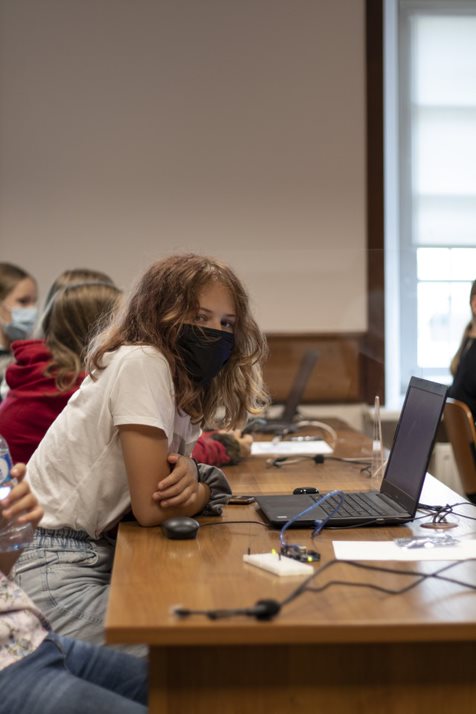
Although not all the girls were equally active in the mini-projects, we were undoubtedly proud of all 34 participants – each of whom contributed in their own way – some were interested in creating ideas, others in constructing, programming, artistically presenting the work or presenting it to the audience. It is very unfortunate that the COVID situation did not allow for larger gatherings of people, so we were not able to invite the girls’ parents to the presentation. Well, the girls really told them their impressions because we got a lot of parental thanks.
Another activity that interested and involved girls is programming activities – creating a virtual vision of Vilnius with the help of TeachLeadtech lecturers. The girls really didn’t limit their imagination in creating a vision for their future city. In addition, they were really pleased with the news that they would be able to use the program after school as well.
Here are some girls ’thoughts on summer school:
“I liked creating the project the most, it was a lot of fun when you find out that the project you made works and can be useful for others, and I also really enjoyed collaborating and working in groups.”
“I liked success stories, it was very interesting to construct”
“It was a lot of fun and exciting at school, it is possible to develop imagination and thinking here”
“Smart girls gather here, you can talk to them, all friendly. It’s very interesting here, you can get acquainted with circuits and electronics. ”
“I really enjoyed school and entered STEM into science”
“It’s a great opportunity to learn more about STEM and find out who you want to be, what you want to achieve.”
Throughout the school, the girls were cared for by great future teachers Martyna Vilutytė, Gabija Raubaitė, Karolina Kuzmaitė. It was obvious the girls wanted the school to continue and because of their friendship with the student volunteers.
